Back to Blogs
The Importance of Chimney Relining: Safeguarding Your Home and Enhancing Efficiency
May 23, 2023

Introduction:
When it comes to homes with fireplaces or wood-burning stoves, the chimney often goes unnoticed despite its vital role in ensuring safe and efficient heating. An essential aspect of chimney maintenance is chimney relining, which involves adding a new lining to the interior of the chimney. This process offers numerous benefits that protect your home and improve energy efficiency. In this article, we will delve into the importance of chimney relining and why it should be a regular part of your home maintenance routine.
Ensuring Safety:
Chimney relining holds great importance in terms of safety. Over time, the heat, smoke, and combustion gases emitted by your fireplace or wood-burning stove can degrade the chimney liner. Cracks, gaps, or missing tiles in the lining can allow harmful substances, such as odorless and colorless carbon monoxide, to seep into your living space. Carbon monoxide poses a serious health risk and can even be fatal in high concentrations. By relining your chimney, you create a protective barrier that prevents these hazardous gases from entering your home, ensuring the well-being of your family.
Minimizing Fire Hazards:
The accumulation of creosote, a highly flammable substance, on the inner walls of chimneys is a common occurrence. A damaged or compromised chimney liner increases the risk of chimney fires as the intense heat can ignite the creosote buildup. These fires can spread rapidly, endangering your property and the safety of your household. Chimney relining significantly reduces the chances of such fires by providing a secure barrier. This not only protects your home but also maintains its structural integrity.
Improving Energy Efficiency:
Optimizing the energy efficiency of your heating system is another key benefit of chimney relining. A deteriorated or inefficient chimney liner can cause substantial heat loss. When warm air from your fireplace or wood-burning stove rises through the chimney, a compromised liner allows it to escape before effectively heating your home. This heat loss not only decreases the efficiency of your heating system but also increases your energy bills. Chimney relining establishes a smooth and insulated pathway for the hot air, minimizing heat loss and maximizing energy efficiency. Over time, this can lead to significant cost savings.
Extending Chimney Lifespan:
Chimneys endure various elements, including extreme temperatures, moisture, and corrosive byproducts of combustion. These factors gradually deteriorate the chimney liner and, ultimately, the structure itself. By relining your chimney, you create a protective barrier that shields the chimney’s masonry and mortar joints from these elements. This helps extend the lifespan of your chimney, reducing the need for costly repairs or even complete rebuilding in the future.
Conclusion:
Chimney relining should never be overlooked as it plays a crucial role in maintaining a safe and efficient heating system. By preventing the leakage of harmful gases, minimizing fire hazards, improving energy efficiency, and extending the lifespan of your chimney, relining ensures the well-being of your family, reduces expenses, and preserves your home’s integrity. Make chimney relining a priority in your regular home maintenance routine to enjoy the benefits of a safer and more efficient heating system.
